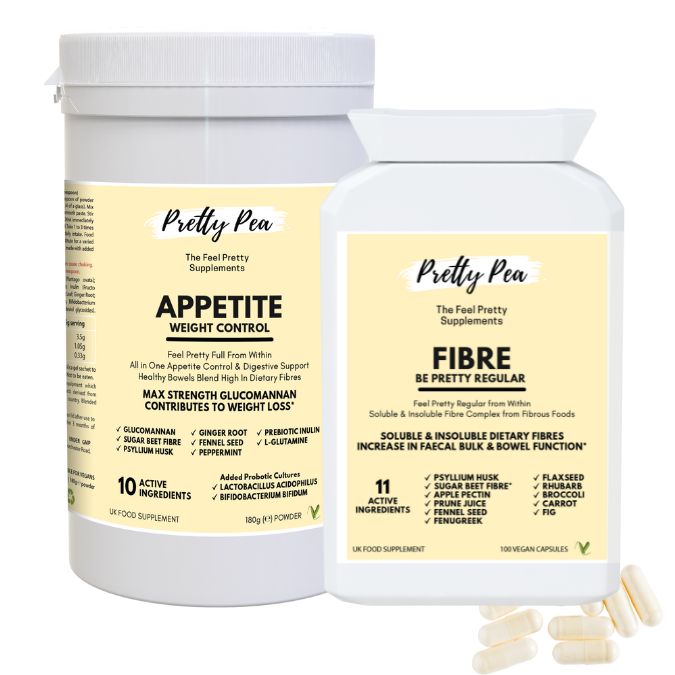Introduction
In the quest for weight loss, many people often overlook the importance of dietary fibre. However, research suggests that consuming sufficient amounts of soluble fibre can play a significant role in promoting weight loss and improving overall health. This comprehensive guide will explore the various ways in which soluble fibre can aid in weight loss, including its impact on gut bacteria, inflammation, and appetite suppression. We share a checklist of the different sources of soluble fibre and what you need to know about the pros and cons of fibre supplements.
Gut Microbiome and Soluble Fibre
The human gut is home to trillions of bacteria, collectively known as the gut microbiome. These bacteria play a crucial role in maintaining overall health, including weight management and metabolism. Soluble fibre, which is not digested by the gut, serves as a source of nourishment for these beneficial gut bacteria. This type of fibre, known as prebiotic fibre, or fermentable fibre. It’s essential for optimal gut health and body weight management and a nutrient many of us don’t consume enough of.
Studies have shown that a high intake of soluble fibre can positively influence the composition and function of the gut microbiome (1). By providing nourishment to these bacteria, soluble fibre promotes their growth and activity, leading to improved overall health and weight management.
Soluble Fibre and Inflammation
Chronic inflammation is a common underlying factor in many chronic diseases, including obesity. The gut microbiome plays a crucial role in regulating inflammation levels in the body. Soluble fibre has been found to reduce inflammation by promoting the production of short-chain fatty acids (SCFAs) by gut bacteria (2).
SCFAs, such as butyrate, have anti-inflammatory properties and help maintain a healthy gut lining. By reducing gut inflammation, soluble fibre can contribute to improved metabolic health and a lower risk of chronic diseases associated with obesity, such as heart disease and metabolic syndrome (3).
Appetite Suppression and Soluble Fibre
To achieve weight loss, it is essential to create a calorie deficit, where more calories are burned than consumed. While calorie counting is a common approach, certain dietary strategies can naturally reduce appetite, leading to lower calorie intake without conscious effort. Soluble fibre has been shown to be one such strategy.
Viscous soluble fibres, such as pectins, beta-glucans, psyllium, glucomannan, and guar gum, form a gel-like substance in the gut when combined with water (4). This gel slows down the emptying of the stomach, prolonging the feeling of fullness and reducing appetite. Research suggests that consuming high-viscosity soluble fibres can lead to automatic weight loss by reducing calorie intake (5).
Additionally, some evidence suggests that soluble fibre may specifically target belly fat, which is associated with increased health risks (6). By incorporating more high-viscosity soluble fibres into your diet, you can not only suppress your appetite but also target stubborn abdominal fat.
Fibre Supplements: Pros and Cons
While fibre supplements are widely available, their effectiveness in promoting weight loss is still a topic of debate. Some studies have found that isolated fibres, such as psyllium and guar gum, do not result in significant weight loss (7). However, one notable exception is glucomannan, a fibre extracted from the konjac root, which has shown promise in reducing body weight (8).
We’re a big fan of glucomannan here at Pretty Pea – it’s combined in both our Meno Weight and Pretty From Within weight loss capsules and also as a powder, combined with prebiotic fibre and probiotics in Appetite.
Our High Fibre capsules contain high quality soluble and insoluble fibres derived from a range of foods such as psyllium husk, flaxseed, sugar beet, prune juice, fig fruit, rhubarb, pectin and other naturally high-fibre foods and herbs.
These fibre complex capsules provide a healthy combination of both insoluble and soluble fibre (a key ingredient to a healthy, varied and balanced diet). More than just roughage – they provide cellulose, pectin, hemicellulose, lignin and gums. Ideal support for those who do not consume enough fibre on a daily basis and those looking for support with regularity, an increase in faecal bulk, normal bowel function and a lower toxic load.
Sugar beet fibre contributes to an increase in faecal bulk in two ways: the insoluble components of the fibre increase faecal bulk by absorbing water in the large intestine, while the soluble components are fermented by bacteria in the large intestine leading to an increase in bacterial mass. As such, this source of fibre may have a beneficial physiological effect for people who want to improve or maintain a normal bowel function.
It is important to note that relying solely on fibre supplements may not yield the same health benefits as consuming fibre-rich whole foods. Whole plant foods not only provide fibre but also contain other essential nutrients and phytochemicals that contribute to overall health. Therefore, it is recommended to focus on incorporating high-fibre foods into your diet rather than relying solely on supplements.

Incorporating Soluble Fibre Foods into Your Diet
To reap the benefits of soluble fibre for weight loss, it is crucial to incorporate fibre-rich foods into your daily diet. Here are some excellent sources of soluble fibre:
- Legumes: Beans, lentils, and chickpeas are not only rich in fibre but also provide a good source of plant-based protein.
- Flaxseeds: These tiny seeds are packed with fibre, omega-3 fatty acids, and antioxidants. They can be easily incorporated into smoothies, yogurt, or baked goods.
- Vegetables: Asparagus, Brussels sprouts, and broccoli are excellent sources of soluble fibre. Aim to include a variety of vegetables in your meals to maximize fibre intake.
- Whole Grains: Oats, quinoa, and brown rice are examples of whole grains that provide both soluble and insoluble fibre. These grains can serve as a nutritious base for your meals.
Remember that when increasing your fibre intake, it is important to do so gradually to allow your body to adjust. Rapidly increasing fibre intake can lead to temporary digestive discomfort, such as abdominal cramps and diarrhoea.
Combining Soluble Fibre with a Healthy Lifestyle
While soluble fibre can be an effective tool for weight loss, it is important to remember that long-term results require a holistic approach. Simply adding more fibre to your diet without making other lifestyle changes may not lead to sustainable weight loss.
To maximize the benefits of soluble fibre, consider adopting the following healthy habits:
- Regular Exercise: Engaging in physical activity not only helps burn calories but also supports overall health and well-being. Aim for a combination of cardiovascular exercise and strength training.
- Balanced Diet: In addition to incorporating soluble fibre, focus on consuming a balanced diet that includes a variety of nutrient-dense foods. Make sure to include lean proteins, healthy fats, and a wide range of fruits and vegetables.
- Portion Control: Be mindful of portion sizes to avoid overeating. Consider using smaller plates and bowls to help control portion sizes.
- Hydration: Drink an adequate amount of water throughout the day. Staying hydrated can help curb cravings and support overall health.
- Stress Management: Chronic stress can contribute to weight gain, especially abdominal fat and hinder weight loss efforts. Incorporate stress management techniques such as meditation, yoga, or engaging in hobbies to promote overall well-being.
By combining these healthy habits with a high-fibre diet, you can optimize your weight loss journey and improve your overall health.
Conclusion
Incorporating soluble fibre into your diet can be a powerful tool in promoting weight loss and improving overall health. The beneficial effects of soluble fibre on gut bacteria, inflammation, and appetite suppression make it an essential nutrient for those seeking to shed excess pounds. While fibre supplements can be an option, especially glucomannan, it is recommended to prioritize whole plant foods as they provide additional health benefits. By combining soluble fibre with a healthy lifestyle, including regular exercise and a balanced diet, you can achieve sustainable weight loss and improve your overall well-being.
Remember, weight loss is a journey, and patience and consistency are key. Embrace the power of soluble fibre for a healthier, leaner you.

